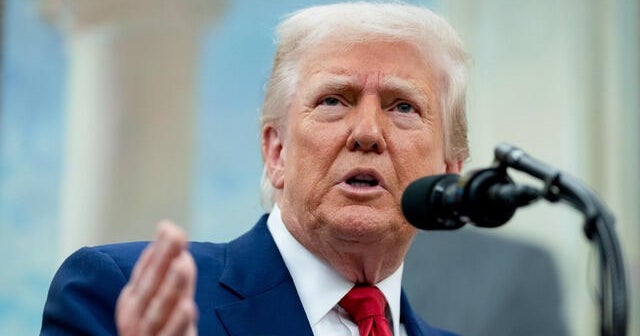US Court Blocks Certain Trump Tariffs

A significant ruling by the U.S. Court of International Trade (CIT) on Wednesday has invalidated President Donald Trump's widespread "reciprocal tariffs," which had been imposed on China and other major U.S. trading partners. This decision represents a substantial challenge to the Trump administration's trade policies, specifically targeting levies unveiled at a "Liberation Day" ceremony and halting further application of these duties.
The court found that President Trump exceeded his authority by invoking the International Emergency Economic Powers Act (IEEPA) of 1977 to implement these tariffs. The CIT stated that the "Worldwide and Retaliatory Tariff Orders exceed any authority granted to the President by IEEPA to regulate importation by means of tariffs." The IEEPA grants the president emergency powers to regulate the U.S. economy in response to a national emergency, but its use to impose tariffs, thereby bypassing Congress, was deemed legally untested and an overreach. Oregon Attorney General Dan Rayfield commented that the ruling "reaffirms that our laws matter, and that trade decisions can’t be made on the president’s whim."
The invalidated tariffs included those imposed in early April, which reached as high as 145% on imports from China and over 30% on goods from many other nations. Although President Trump had later paused some of these tariffs for 90 days amidst ongoing trade negotiations and a U.S.-China trade agreement had led to some reductions, the CIT's decision orders a permanent stop. Should the administration's appeal fail, businesses that paid these tariffs since their inception could receive refunds plus interest. The ruling also struck down a separate 10% tariff on goods from nearly all countries and specific tariffs on Mexico and Canada related to the fentanyl trade. However, the decision does not affect sector-specific tariffs, such as those on autos, steel, and aluminum, which were imposed under different legal statutes like Section 232 of the Trade Expansion Act.
The Trump administration responded swiftly, appealing the CIT's ruling to the U.S. Court of Appeals for the Federal Circuit within minutes. This action initiates what experts predict could be a lengthy legal battle, potentially escalating to the Supreme Court. White House Deputy Press Secretary Kush Desai criticized the court's decision, stating, "it is not for unelected judges to decide how to properly address a national emergency." Lale Akoner, a global market analyst at eToro, described the situation as "the beginning of a lengthy legal battle, one that could ultimately reach the Supreme Court, a development with significant market implications." If the appeal is unsuccessful, Jim Reid of Deutsche Bank suggested the administration might explore expanding other tariff instruments.
In the financial markets, U.S. Treasury yields moved slightly higher on Thursday following the news. The 30-year Treasury yield rose over 3 basis points to 5.013%, the 10-year yield climbed more than 4 basis points to 4.523%, and the 2-year yield was up over 3 basis points to 4.027%. Adam Crisafulli of Vital Knowledge attributed this rise to expectations of reduced tariff revenue for Washington, which could exacerbate the deficit and debt situation, especially with a reconciliation bill pending. The ruling has occurred amidst general concerns that high tariffs could damage both the U.S. and global economies and fuel inflation. Investors are also awaiting fresh economic data, including the gross domestic product (GDP) growth rate and the Personal Consumption Expenditures (PCE) index, the Federal Reserve's preferred inflation measure, for further insights.
Global stock markets initially reacted positively to the potential unwinding of the tariffs, with investor sentiment generally buoyed. The FTSE 100 in London opened 0.6% higher before paring gains. Asian markets also saw advances, with the Shanghai Stock Exchange up 0.7%, Japan's Nikkei gaining 1.88%, and Hong Kong's Hang Seng Index rising 1.35%. However, U.S. stock markets exhibited a mixed performance on Thursday: the Dow Jones Industrial Average fell slightly by 0.06% (25 points), while the S&P 500 increased by 0.3%, and the tech-heavy Nasdaq Composite climbed 0.6%. Derren Nathan, head of equity research at Hargreaves Lansdown, noted, "In this rapidly evolving landscape the latest development is unlikely to be the last twist in the tale."
Other market segments also responded to the ruling. The British pound experienced a slight decline as sentiment around the U.S. economy improved. Oil prices received a boost, with Brent crude trading 1.17% higher, as the prospect of tariff removal and potential new sanctions on Russia eased concerns about global economic damage and oversupply. Conversely, gold prices fell by over 0.6%. The precious metal, often a safe-haven asset, had surged when the tariffs were first announced, so the possibility of their removal led to a pullback. This court decision follows a period where a U.S.-China trade agreement had already reduced some tit-for-tat tariffs, leading some Wall Street firms to soften their recession forecasts.












